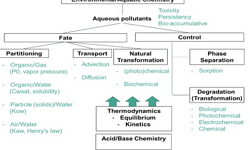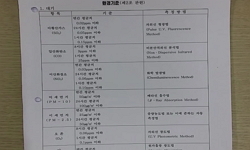The Federal Water Pollution Control Act of 1948이 미국최초의 수질보호법이다. 이후 국민들의 수질보호에 대한 강력한 인식과 염려로 1972년에 당시의 위법을 전면 개정하여 현재의 Clean Water Act를 제정...
http://chineseinput.net/에서 pinyin(병음)방식으로 중국어를 변환할 수 있습니다.
변환된 중국어를 복사하여 사용하시면 됩니다.
- 中文 을 입력하시려면 zhongwen을 입력하시고 space를누르시면됩니다.
- 北京 을 입력하시려면 beijing을 입력하시고 space를 누르시면 됩니다.
https://www.riss.kr/link?id=A102167658
- 저자
- 발행기관
- 학술지명
- 권호사항
-
발행연도
2016
-
작성언어
Korean
-
주제어
점원오염원 ; 오염물질 ; 시민소송 ; 연방환경청 ; 연방항소법원 ; 행정처분 ; civil suit ; EPA Administrator ; pollutant ; clean water act ; administrative procedure act.
-
등재정보
KCI등재
-
자료형태
학술저널
-
수록면
295-316(22쪽)
- 제공처
-
0
상세조회 -
0
다운로드
부가정보
다국어 초록 (Multilingual Abstract)
The Federal Water Pollution Control Act of 1948이 미국최초의 수질보호법이다. 이후 국민들의 수질보호에 대한 강력한 인식과 염려로 1972년에 당시의 위법을 전면 개정하여 현재의 Clean Water Act를 제정하게 된 것이다. Clean Water Act의 목적은 미국의 물을 화학적 물리적 그리고 생물학적으로 정상적인 상태를 회복하고 유지하는 것이 다. Clean Water Act의 핵심은 수질 오염자에 의한 점원(point source)오염물질의 직접 적인 방출을 통제하는 것이다. 즉 CWA는 기본적으로 오염물질의 방출은 위법한 것으로 규정하고 있다. 그러나 미국 환경청(Environmental Protection A gency(EPA))의 허가(permit)를 받으면 오염물질의 방출이 가능하다. 이러한 통제는 CWA의 국가 오염원 방출 제거 시스템 (The National Pollutant Discharge Elimination System(NPDES))에 의해 오염원 방출량 및 수질보존 기준이 정해지며 집행된다. 그러므로 NPDES야말로 CWA 목적달성을 위한 구체적인 집행 제도라고 할 수 있는 것이다. 연방환경청 행정관(EPA Administrator) 은 일반 시민의 공청회를 거친후 오염물질 방출 허용기준(permit)을 발령할 수 있다. 오염 물질 방출자는 오염물질 방출을 위해서 일정한 조건과 절차에 따라 행정관에게 허가 신청을 해야 하는 것이나 행정관은 오염물질 배출자의 신청행위 없이 일방적으로 광범위한 지역에서 특정오염물질의 배출을 일반적으로 허가할 수 있다(general permit). 이때 행정관은 오염물질 방출관련 자료 정보 등의 수집방법과 보고 및 다른 필요한 조건 등의 여러 permit 조건들을 규정하여야 한다. CWA상의 EPA에 의한 NPDES permit의 발령 은 행정처분의 성격을 가진다. 그러므로 CWA는 EPA가 NPDES permit를 발령하기 전에 이를 일반시민에게 공표하고 나아가 공청회를 개최하도록 하고 있다. EPA의 NPDES permit 결정에 대한 불복심판청구는 환경항소 위원회(EPA`s Environmental Appeals Board)에 제기할 수 있으며 나아가서는 연방항소법원(federal court of appeals) 에 소 송을 제기 할 수 있다. 법원은 NPDES permit 발령은 준 사법적 절차를 따라야 한다고 판결하고 있다. 모든 시민은 수질보호를 위해 오염물질 방출자에 대해 시민소송의 주체가 될 수 있다. 여기서 시민은 불리한 법적이익을 받을 가능성이 있는 모든 사람을 의미한 다. 즉 소송의 주체가 되기 위한 시민은 기본적으로 당해사건에서 헌법이 요구하는 당사 자 적격을 가져야한다. 즉 소송의 주체(원고)가 되기 위해서는 자신이 방출된 오염물질로 인해 실질적인 상해나 손해를 받고 있음을 입증해야 한다. 소송의 대상은 clean water act 상의 오염물질 방출 기준을 위배하거나 위 관련법과 관련해서 행정기관이나 주정부 가 발령한 명령을 위반한 미연방정부나 연방정부 기관에 대해서, 그리고 행정기관이 법적으로 기속행위인 의무나 법적행위를 이행하지 않은 경우 위 행정기관에 대해 소송을 제기할 수 있다. 이러한 경우 소송가액이나 당사자의 시민권 주소지와 관계없이 재판권은 연방정부의 지방법원에 속한다.
다국어 초록 (Multilingual Abstract)
The Federal Water Pollution Control Act of 1948(FWPCA) is the first act to protect the water from the pollution in USA. The current Clean Water Act was established to strengthen water preservation amending entire FWPCA in 1972. The objective of this C...
The Federal Water Pollution Control Act of 1948(FWPCA) is the first act to protect the water from the pollution in USA. The current Clean Water Act was established to strengthen water preservation amending entire FWPCA in 1972. The objective of this CWA is to restore and maintain the chemical, physical, and biological integrity of the Nation`s waters. According to the CWA, the discharge of any pollutant by any person shall be unlawful without the permits for discharge of pollutants from EPA. This is just NPDES. As authorized by the Clean Water Act, the National Pollutant Discharge Elimination System (NPDES) Permit Program controls water pollution by regulating point sources that discharge pollutants into waters of the United States. EPA Administrator may, after opportunity for public hearing, issue a permit for the discharge of any pollutant, or combination of pollutants upon condition that such discharge will meet either all applicable requirements or prior to the taking of necessary implementing actions relating to all such requirements, such conditions as the Administrator determines are necessary to carry out the provisions of this CWA. Courts held that the permit issuance process was subject to the adjudicatory procedures mandated by sections 554-557 of the Administrative Procedure Act (“APA”). In order to enforce the CWA, CWA provides the civil suit system. CWA civil suit stipulates that any citizen may commence a civil action on his own behalf (1) against any person (including (i) the United States, and (ii) any other governmental instrumentality or agency to the extent permitted by the eleventh amendment to the Constitution) who is alleged to be in violation of (A) an effluent standard or limitation under this chapter or (B) an order issued by the Administrator or a State with respect to such a standard or limitation, or (2) against the Administrator where there is alleged a failure of the Administrator to perform any act or duty under this chapter which is not discretionary with the Administrator. The district courts shall have jurisdiction, without regard to the amount in controversy or he citizenship of the parties, to enforce such an effluent standard or limitation, or such an order, or to order the Administrator to perform such act or duty, as the case may be, and to apply any appropriate civil penalties under CWA.
동일학술지(권/호) 다른 논문
-
- 경상대학교 법학연구소
- 강대성 ( Kang Dae-seong )
- 2016
- KCI등재
-
미국 환경보호청(EPA)의 이산화탄소 지중저장 규칙과 그 시사점
- 경상대학교 법학연구소
- 고문현 ( Koh Moon-hyun )
- 2016
- KCI등재
-
- 경상대학교 법학연구소
- 고재종 ( Koh Jae-jong )
- 2016
- KCI등재
-
- 경상대학교 법학연구소
- 김종회 ( Kim Jong-heoi )
- 2016
- KCI등재






 KISS
KISS



